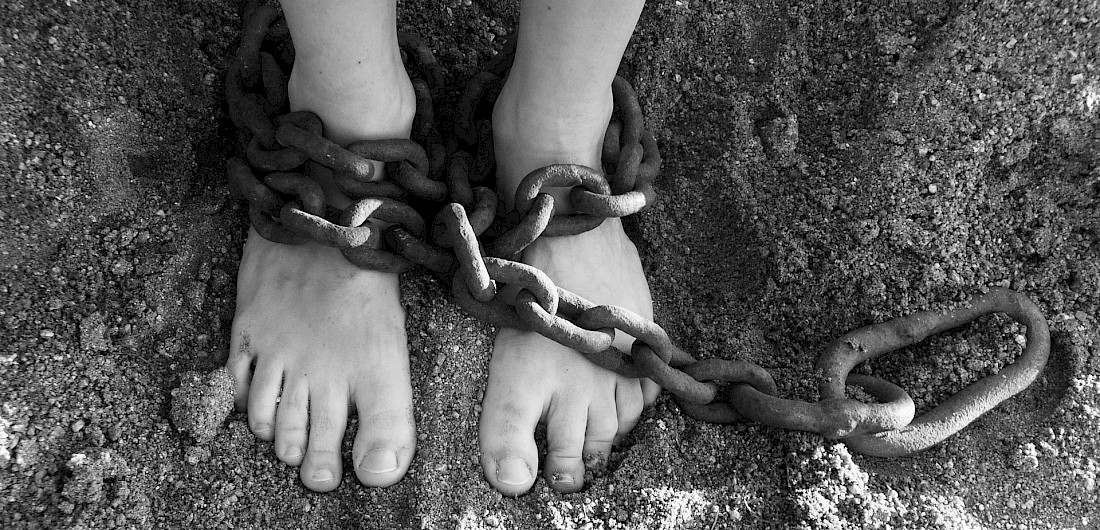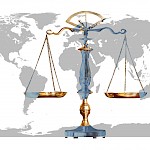The Gospel of Salvation - Part 1: Justification from sins
The questions and answers contained in this chapter can be read as an introduction to Romans 1 - 5:11.
The following chapter (chapter 6) deals with Romans 5:12 - 8.
5.1 What is the meaning of the word 'Gospel'?
In ancient Greece, when a battle was won, a messenger was sent back from the battlefield to report the victory in the home city. Coming nearer, he would exclaim this one word ‘euangelion’: good news - the battle is won!

5.2 What is the subject of the Gospel?
The gospel tells us how, when humanity had completely failed, God established a way it could be brought into a positive relationship with Him. This way is through His Son, the Lord Jesus, who was and is God but became man and died on the cross for sinners: ‘the gospel of God… concerning His Son’ (Rom 1:1, 3). This is the one and only way that leads to God (Acts 4:12). Man did not seek God but the good news is that God sought man (see Luke 15).

5.3 Why was Paul not ashamed of the Gospel ( Rom 1:16, 17)?
Paul might have been ashamed of the gospel because man, by nature, is opposed to a message that declares him guilty and he despises those who bring it. Bringing the gospel to sinners entails reproach.
But Paul was not ashamed for several reasons. First, the gospel is the ‘power of God’ to everyone who believes (v. 16). It has the power to transform people and to bring them to God (if they accept and believe it). Also, the gospel is universal (for Jews and Gentiles, 1:16). Finally, the righteousness of God (Q 5.4) is ‘revealed’ (v. 17) in this gospel.

5.4 What is the righteousness of God?
God shows He is righteous by:
- condemning the sinner in His wrath (Rom 1:17, 18)
- raising Jesus from the dead and giving Him a place of honour (Jn 16:10)
- forgiving sins that are confessed (1. Jn 1:9)
- justifying those who believe on Jesus (Rom 3:25, 26; 4:5).
The last of these is surprising at first sight: that God should justify guilty sinners! To see the solution to this problem, have a look at Q 5.11 and Q 5.12.

5.5 Who needs the Gospel?
Everyone. Paul divides mankind into three groups:
- people who have lost all knowledge of the true God and who do not have any rules of behaviour (Rom 1:18-32)
- moralists, i.e. people who make themselves certain rules of behaviour (Rom 2:1-16)
- Jews (Rom 2:17-3:9).
Everyone belongs to one of these three groups. And Paul demonstrates that each group is guilty before God.

5.6 Are there no exceptions? What about cultivated people? Or Israel?
No - in the final analysis all are guilty. Those who belong to the first group (people who do not give themselves any rules, Q 5.5) are guilty, even if they have never heard the gospel, because they could have known the Creator simply by looking at the creation around them but refused to do so. The moralists (group 2, Q 5.5) made rules but did not keep them and acted against their consciences (Rom 2:15). Israel had the law of Moses from God and broke it.
‘There is none righteous, no not one’ (Romans 3:10). ‘For there is no difference: For all have sinned, and come short of the glory of God’ (Rom 3:23).

5.7 Is there no solution?
There is. To see what exactly this solution is, bear in mind that God is a righteous judge and He is holy, and abhors sin. He knows each and every one of your sins. There are only two options. Either He must condemn you or you must be ‘made righteous’ before Him. To see how this can be done, please look at the following questions.

5.8 What does it mean to be ‘justified’ (Rom 3:20)?
Justified means ‘declared righteous.’ This is even better than being innocent. If you are justified, you can point to Christ at God’s right hand and say, ‘I belong to Him, that’s why I’m righteous.’ Adam in his state of innocence before he sinned could not do this. So, if someone wanted to condemn you as guilty, he would first have to condemn Christ as unrighteous, and this is impossible (Rom 8:34). Being justified, we are therefore righteous. But this righteousness does not come from us, nor from man; it is the ‘righteousness of God’ that God imputes (or attributes) to us. See Romans 4:3, 5, 11 and Philippians 3:9.

5.9 What is meant by ‘works of the law’ (Rom 3:20)?
Works of the law are not only works aimed at keeping the law of Moses but works aimed at keeping any kind of law (literally: ‘works of law’). The point of keeping a religious law is to gain God’s approval and to maintain that position. Put at its crudest, it is the way most people think they can be saved - ‘if you’re good, you’ll go to heaven.’ Sadly, none of us are good. The people of Israel proved in the case of the law of Moses that man is incapable of keeping the law or, for that matter, any law. This is a general principle. There are no works - nothing that man can do - that would make him just or righteous before God.

5.10 So how can anyone be justified before God (Rom 3:22-25)?
As far as we are concerned, only ‘by faith.’ As far as God is concerned, only ‘by grace.’ ‘By faith’ means that we trust in Christ, that He has paid the price for our sins and that this is enough. ‘By grace’ means that we can only accept what God gives, that we cannot do anything ourselves or add anything to what He has done.
But we are also justified by blood. By blood means that the Lord Jesus had to die as our substitute.

5.11 What is meant by ‘Whom God hath set forth to be a propitiation...’? (Rom 3:25)
The Hebrew word for ‘propitiation’ or ‘atonement’ is literally ‘covering’ - see Q 2.7. In the Old Testament it was used for the lid, or ‘cover,’ of the ark of the covenant. This lid was made of pure gold, speaking of the immaculate glory of God. The tables of the law, which could only declare man guilty, were in the ark. The cherubim (guardians of the holiness of God, and executors of divine judgement, Gen 3:24) looked down on to the lid of the ark (Ex 25:20; 37:9) and had to acknowledge that God was righteous to condemn man. But when the lid of the ark was sprinkled with blood (Lev 16:14-16, 33) - the blood of an innocent victim, shed for a guilty people - God was able to spare
His people.
This is a picture of what Christ has done: He gave his life - His blood was shed - so that God does not have to judge us. We are ‘covered’ by His Son’s giving His life for us.

5.12 How can God justify a sinner and at the same time be just?
Because Christ became our substitute, i.e. He has taken our place and borne the judgement for our sins.
If you pay my debt, then what can the judge do? Nothing! Someone else has paid on my behalf. No man could have invented such a wonderful means of justification and forgiveness, and that is why the gospel is such a wonderful message. God forgives (wonderful enough in itself) but does not overlook sins. He forgives after having judged sins and condemned sin. The problem has been solved, but in a righteous way.

5.13 What about Old Testament Saints? How were they justified (Romans 4)?
In the same way as New Testament believers: by faith. Abraham believed God and this was counted as righteousness for him (Rom 4:3). And God could do this, righteously, because He looked at the then future sacrifice of Christ (Rom 3:25, 26).

5.14 But does not James say that Abraham was justified by works?
True. But James is not talking about how we can be justified by God, but that our actions should show (to men) that we have been justified. The only proof that our faith is real is the works we do after we have been saved (Jms 2:21, 22). How could it be seen (by men) that Abraham was righteous? Only by his works. When he went to offer Isaac, he gave the proof. But God knew long before that Abraham believed and He counted him righteous then (Gen 15:6).

5.15 Why was Christ raised for our justification (Rom 4:25)?
The work of Christ was complete when He said, ‘It is finished’ and ‘delivered up his spirit’ (Jn 19:30, JND) and died. But by His resurrection God showed to men and angels that He had accepted the death of His Son as fully sufficient; that He was fully satisfied with Christ and His work.
God remains righteous when He justifies those who believe on Jesus (Rom 3:26), i.e. those who put their trust in Christ’s work on the cross. The resurrection proves that the work of the cross has been accepted by God and confirms our faith.

5.16 What are the consequences of justification (Rom 5:1)?
We have peace with God. There are no outstanding issues between God and ourselves! There is nothing to separate. It is not a promise that the believer will have peace with God; he has it already! No obstacles are left in our relationship with God.
It is not only that God no longer has anything against us, but that we positively stand in His favour (v. 2). God is favourable towards us; He is ‘for us’ (Rom 8:31). His thoughts and His sentiments toward us are positive.
And there is much more: read Romans 5:1-11 to see the wonderful consequences of justification and peace with God.

5.17 What are the practical consequences in our lives?
The following verses (Rom 5:3-11) show us that tribulations (trials and severe difficulties) that we have to go through in our lives become a means of glory for us, and there is a process of growth in patience, experience and hope as a result. The love of God has been poured into our hearts by the Holy Spirit. God showed this love towards us when Christ died for us - when we were still sinners.
In conclusion, if God has already done everything for us and if He has given the maximum possible for us when we were still enemies, how much more will He, now that we stand in His favour and have been reconciled, save us practically in every difficulty we encounter in our lives and save us from the future wrath! What an assurance!


















